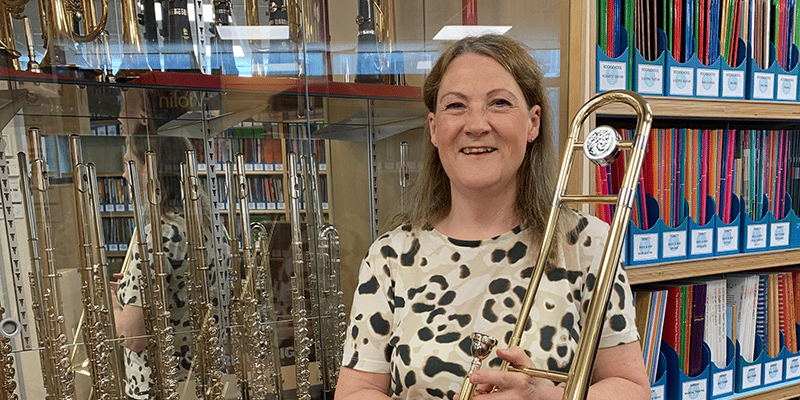How long have you worked at Brittens Music?
I came to work in Brittens Music shop in 1983. It was my first job after studying music at Goldsmiths College. My Dad actually found it for me in an advert in the local newspaper!
I originally wanted to become an orchestral librarian. But I am a people person at heart, so working in retail is a great fit because it gives me the chance to interact with all sorts of people.
My classical knowledge is really good, which is particularly useful in my role. It’s not such a common area of expertise so it’s something I can really help customers with.
What gets you out of bed in the morning?
Music is my passion. It’s incredibly important and has a place in pretty much everybody’s lives. It’s highly emotive and affects people differently – it can be calming, exhilarating, and soothing.
I find music retail incredibly interesting. There is so much to learn, about the instruments and the music – I’m still finding out new things, even after 40 years.
How did you discover your love of music?
My first musical memory is from primary school. I was around 10 years old when I saw an American student play the guitar.
I was instantly hooked. I loved it so much that my dad bought me a cheap guitar from Woolworths. I learned to play a few chords and haven’t looked back.
My second musical serendipity was a few years later at secondary school. A chance encounter with some brass instruments together with the fact I was tall, meant I was picked to have a go at the trombone.
What I love about playing the trombone is the broad range of material I can play – from orchestral symphonies to musicals, from concert pieces to popular band music. It’s an incredibly versatile instrument.
I also play the euphonium; an instrument that looks like a small tuba. I took it up around 20 years ago but have been playing more seriously for the past 10 years.
‘Music has mental health benefits. Research has shown that listening to music releases dopamine’
Why is music important?
Playing music is incredibly important for social development, dexterity, and fine motor skill development. It’s great for building concentration and comprehension.
Understanding how to read music can make learning other subjects easier.
There are also proven mental health benefits of music. Research has shown that listening to music releases dopamine, the ‘happy hormone’. A study a few years ago found levels of dopamine were up to 9 per cent higher in volunteers that were listening to music they enjoyed.








